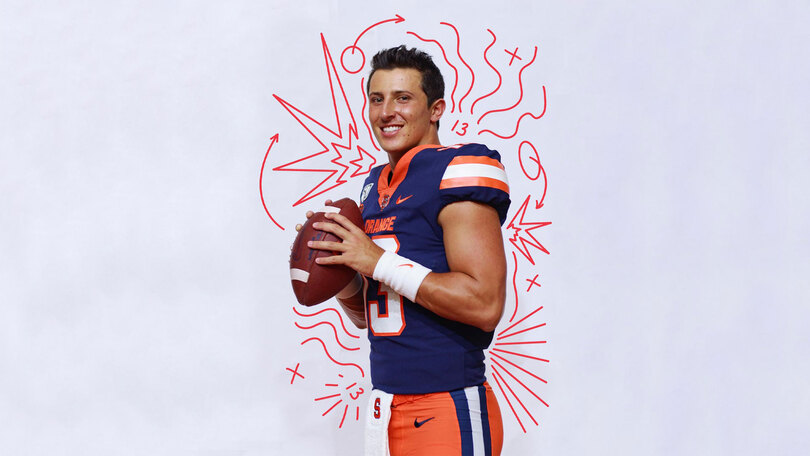DeVito’s trained to be a starting quarterback since he linked up with quarterback coach Leon Clarke at six years old. He dissected defenses and developed a quick delivery, effortless long ball and technically sound footwork.
As DeVito entered sixth grade, his dad started media training with his son, Tom said. He often simulated postgame interview questions, gearing DeVito’s answers toward position groups, not specific players. He wanted his son to be fluent in “coach speak,” and avoid offending teammates or opponents.
DeVito was often featured in articles on Youth1, which ranked top prospects in his recruiting class before high school. Once he reached his sophomore season at Don Bosco Prep (New Jersey) High School, DeVito was the expected starter. But then Wesley McKoy, an athlete who could play both receiver and quarterback, transferred and plucked DeVito’s spot.
“If you have to sit, you sit,” Clarke remembered instructing DeVito. “You be a good teammate. You wait your turn.”
If DeVito didn’t play much on a Friday night, he’d throw with Clarke the next Saturday or Sunday. Practice sessions had clear focuses, from run-pass option drills to situational practice based on ball placement and the area of the field.
Clarke’s practice regiments polished DeVito’s skills, but could only take him so far. In DeVito’s final regular season game of his sophomore season — against a rival high school on Thanksgiving — DeVito completed 7-of-16 passes for 155 yards with one touchdown and two interceptions, per NJ.com.
The next season, Don Bosco hired former NFL quarterback Mike Teel as an offensive coordinator. He brought a new offense, similar to what he played with as a quarterback at Rutgers and with the Seattle Seahawks. The reads started simple: How many safeties were there? If there was only one player as the last line of defense in the secondary, then DeVito would look for one set of receivers. If there were two safeties, he’d throw a different direction. Slowly, it became more advanced. DeVito noted where linebackers dropped to coverage and threw opposite their movements.
It was advanced skill play, Teel noted, more comparable to something he’d learned at Rutgers, not in high school. Throughout the season, DeVito learned more about defensive alignments and shifted more play calls at the line. By season’s end, he’d thrown for 17 passing touchdowns and led Don Bosco to a state championship.
“It took him some time to kind of figure it out and catch on because it was different and it was probably pretty difficult,” Teel said. “But as he grew and as he became more comfortable, you could see he had a really high football IQ.”
The summer after his junior season, DeVito surprised scouts at the Elite 11 and The Opening, another top quarterback camp. He quickly rose to a four-star recruit, but Teel remembers that summer for DeVito staying level-headed. He continued his process with Clarke and became one of the strongest players on the team despite being a 193-pound quarterback.








